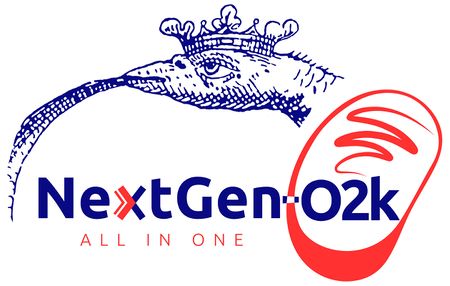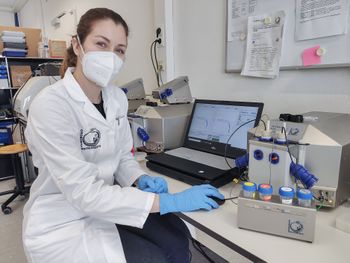Difference between revisions of "NextGen-O2k Scientific developments"
From Bioblast
Laner Verena (talk | contribs) |
|||
| (29 intermediate revisions by 5 users not shown) | |||
| Line 1: | Line 1: | ||
{{ | {{Oroboros highlights page name}} | ||
{{Template:NextGen-O2k header page name}} | {{Template:NextGen-O2k header page name logo}} | ||
<br /> | <br /> | ||
<br /> | <br /> | ||
<br /> | |||
<big><big><big>'''WP2: Scientific developments'''</big></big></big> | |||
__TOC__ | __TOC__ | ||
| Line 12: | Line 12: | ||
== Abstract == | == Abstract == | ||
:::: | :::: The aim of this workpackage is to test measurement conditions for the newly developed modules and the development of specific applications. | ||
::::* Determination of optimal Q-sensor measurement conditions | |||
::::* Determination of optimal measurement conditions for the PB-Module | |||
::::* Development of protocols for scientific, pre-clinical and algal biotechnology applications | |||
::::* Data handling and quality control | |||
== Achievements == | |||
::::'''Project Year 1:''' During testing in the first project year, optimal measurement conditions were determined for using the Q-sensor with a variety of biological samples. Simultaneously testing began of the beta version of DatLab. New SUIT protocols were developed for general, pre-clinical, and algal biotechnology applications. A focus has also been given to internal and external quality control measures. | |||
::::'''Project Year 2:''' During the second project year, measurement conditions and protocols were optimized for the PB- and Q-Modules with a variety of biological samples. Additionally, the NADH-Module for evaluation of the NADH-pool in physio-pathological conditions was integrated in the NextGen-O2k. Testing of modules for the DatLab8 software were conducted and improvements applied. Moreover, SUIT protocols for general, pre-clinical, and algal biotechnology applications were developed. Quality control was maintained during the second period of project, an important factor in the development of the NexGen-O2k instrument and relevant protocols. | |||
== Progress and next steps == | == Progress and next steps == | ||
See » [[Talk:NextGen-O2k Scientific developments|Track record]] | |||
<br/> | |||
<gallery mode=default perrow=4 widths="350px" heights="300px"> | |||
File:Luiza Q-module testing and DatLab8.jpg|[[Cardoso Luiza HD|Luiza Cardoza, PhD.]] testing the Q-Module and DatLab8 | |||
File:Microalgae for testing PB module.jpg|Microalgae for testing PB module | |||
|- | |||
</gallery> | |||
== NextGen-O2k MitoFit Preprints == | |||
{{#ask:[[Instrument and method::NextGen-O2k]] [[Was published in journal::MitoFit Preprint Arch]] | |||
| mainlabel=Link | |||
|?Has info=View | |||
|?Has title=Reference | |||
== | |?Was published in year=Year | ||
|format=broadtable | |||
|limit=5000 | |||
|offset=0 | |||
|sort=Was published in year | |||
|order=descending | |||
}} | |||
Latest revision as of 13:23, 3 April 2022
NextGen-O2k Scientific developments
The revolutionary all-in-one instrument to conquer mitochondrial disease.
WP2: Scientific developments
Abstract
- The aim of this workpackage is to test measurement conditions for the newly developed modules and the development of specific applications.
- Determination of optimal Q-sensor measurement conditions
- Determination of optimal measurement conditions for the PB-Module
- Development of protocols for scientific, pre-clinical and algal biotechnology applications
- Data handling and quality control
- The aim of this workpackage is to test measurement conditions for the newly developed modules and the development of specific applications.
Achievements
- Project Year 1: During testing in the first project year, optimal measurement conditions were determined for using the Q-sensor with a variety of biological samples. Simultaneously testing began of the beta version of DatLab. New SUIT protocols were developed for general, pre-clinical, and algal biotechnology applications. A focus has also been given to internal and external quality control measures.
- Project Year 2: During the second project year, measurement conditions and protocols were optimized for the PB- and Q-Modules with a variety of biological samples. Additionally, the NADH-Module for evaluation of the NADH-pool in physio-pathological conditions was integrated in the NextGen-O2k. Testing of modules for the DatLab8 software were conducted and improvements applied. Moreover, SUIT protocols for general, pre-clinical, and algal biotechnology applications were developed. Quality control was maintained during the second period of project, an important factor in the development of the NexGen-O2k instrument and relevant protocols.
Progress and next steps
See » Track record
Luiza Cardoza, PhD. testing the Q-Module and DatLab8
NextGen-O2k MitoFit Preprints
| Link | View | Reference | Year |
|---|---|---|---|
| Donnelly 2023 MitoFit | MitoFit Preprints 2023.2. Functional hypoxia reduces mitochondrial calcium uptake. | Donnelly C, Komlódi T, Cecatto C, Cardoso LHD, Compagnion AC, Matera A, Tavernari D, Zanou N, Kayser B, Gnaiger E, Place N (2023) Functional hypoxia reduces mitochondrial calcium uptake. MitoFit Preprints 2023.2. https://doi.org/10.26124/mitofit:2023-0002 — 2024-11-17 published in Redox Biol. | 2023 |
| Went 2021 MitoFit PB | MitoFit Preprints 2021.05. | Went N, Di Marcello M, Gnaiger E (2021) Oxygen dependence of photosynthesis and light-enhanced dark respiration studied by High-Resolution PhotoRespirometry. MitoFit Preprints 2021.05. https://doi.org/10.26124/mitofit:2021-0005 | 2021 |
| Huete-Ortega 2020 MitoFit Preprint Arch EA | MitoFit Preprint Arch EA20.1. High-resolution respirometry for chloroplast and mitochondrial bioenergetics in Chlamydomonas reinhardtii ― towards biotechnology exploitations | Huete-Ortega M, Di Marcello M, Iglesias-Gonzalez J, Gnaiger E (2020) High-resolution respirometry for chloroplast and mitochondrial bioenergetics in Chlamydomonas reinhardtii ― towards biotechnology exploitations. https://doi.org/10.26124/mitofit:ea20.algaeurope.0001 | 2020 |





